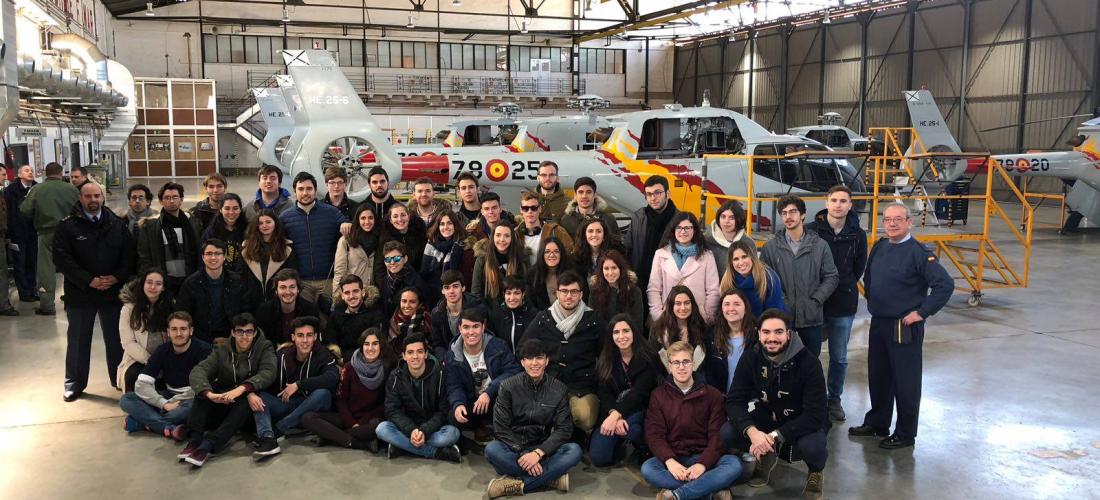Radiography of the Andalusian Aerospace Sector
Radiography of the Andalusian Aerospace Sector
Juan Román Gallego, managing director of the Andalusia Aerospace Business Cluster, and Mélanie Durth, responsible for innovation, have visited the Engineering School of the University of Seville (ETSI) to provide teachers and students with data and information on the Andalusian aerospace sector and its companies, strategy, challenges and opportunities. In this event organized by EUROAVIA Seville with the help of the ETSI, both have presented and detailed the different topics in a presentation that has been very interesting for all attendees.
The aerospace industry in Andalusia has a long and centenary history, entering the top 5 aerospace regions in Europe. Its beginnings date back to 1927, with the creation of a factory of the national company Construcciones Aeronáuticas SA (CASA). The emergence of CASA made the sector very important and the first Spanish aircraft were designed. In 1999, EADS (European Aeronautic Defense and Space Company, now Airbus SE) absorbed CASA, thus becoming part of the European conglomerate. The most important milestone for the region since then is the election of Seville as the site of the A400M FAL. There was an urgent need to promote the union of companies in the area, with the aim of strengthening the Andalusia brand, as well as generating synergies and opportunities between companies, so in 2017 the Andalusia Aerospace business cluster was created.
The Andalusian aerospace sector has a census of 140 companies, 103 of which are in Seville, 22 in Cadiz and 11 in Malaga. In general, the Andalusian aerospace sector is characterized by small and medium-sized companies, around 70% of the industry are SMEs, ie they have less than 250 jobs and their turnover is below 50 million euros.
The total turnover of the sector in 2022 was more than 2.3 billion euros. The pandemic in 2020 caused the inertia of sustained growth to be lost. In 2019 it almost exceeded €3 billion. However, the pace of recovery is accelerating faster than expected. Andalusia accounts for 39% of national aerospace exports. Almost 50% of these exports go to Germany and France, Europe's major aerospace hubs.
One of Andalusia's strengths is the level of infrastructure, with three aerospace parks: Aerópolis in Seville, the Bahía de Cádiz Center and the Andalusia Technology Park in Malaga. It is worth mentioning the benchmark technology center for the Andalusian sector, the FADA-CATEC. Other infrastructures include the ATLAS experimental flight centers in Jaén and the future CEUS in Huelva, planned for next year, which will be the largest drone experimentation test center in Europe.
Institutional support includes TRADE, a public company of the Andalusian Regional Government that promotes the internationalization of Andalusian companies and the attraction of foreign investment; and Invest in Andalusia, an initiative of the Andalusian Government to promote, attract and consolidate foreign investment in the region. The support of the universities is fundamental, both in the field of research projects and doctorates, as well as in giving visibility to the sector to students.
The strength of the sector is due to our privileged location, with powerful companies not only in Andalusia, but also in nearby regions such as Portugal, Morocco and other parts of Spain. Furthermore, the choice of Seville as the headquarters of the Spanish Space Agency makes it even more attractive to locate space companies in the region.
The Andalucía Aerospace cluster is made up of more than 90 companies, fostering cooperation between them, promoting the growth of the aerospace sector in our community at national and international level and increasing the competitiveness of companies through sustainable technological development. To this end, meetings and congresses are held between companies, the Andalusia Aerospace brand is taken all over the world by attending international fairs, and the participation of companies in R&D&I projects is promoted.
The Andalusian region, in addition to the three Airbus aircraft assembly plants in Seville and Cadiz, has pilot training schools such as Pegasus Aero Group in Cordoba or FTEJerez in Jerez de la Frontera, as well as MRO (Maintenance, Repair and Overhaul) markets such as Ryanair's maintenance center in Seville, where its southern European aircraft are repaired.
It is important to have on the horizon the new tractor programs of the sector... The two main European projects at present are FCAS (Future Combat Air System) and Eurodrone, both with Spanish participation. Andalusian industry is well positioned to participate in these programs.
After the speakers' speeches, a question and answer session was opened. These focused mainly on the possible synergies between companies and the university, with the aim of improving the training of students.
